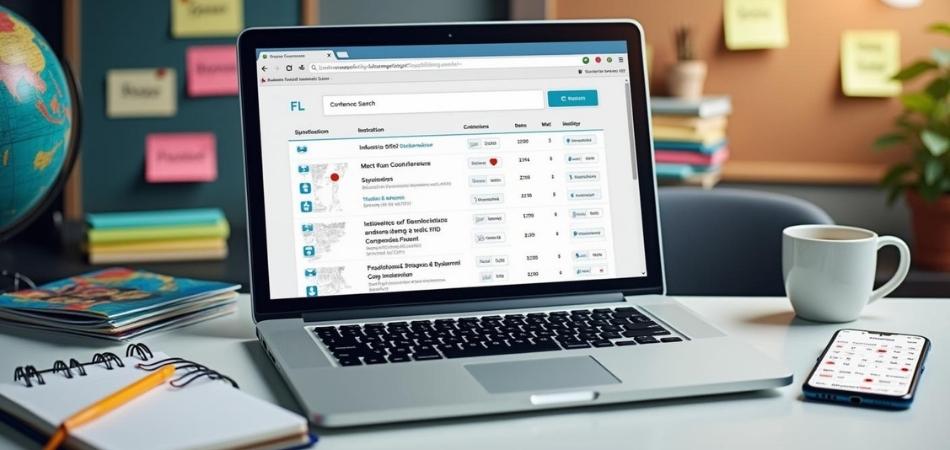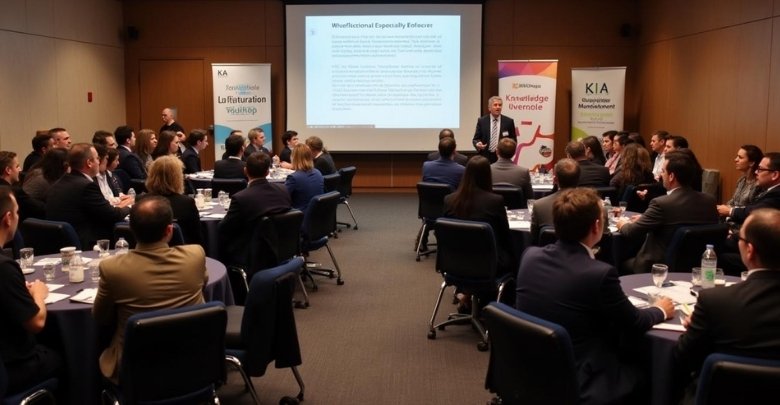The right conference can have a significant impact on your career or research. With countless events worldwide, it’s vital to pick those offering real value. Whether you’re looking to network, present your work, or stay updated on industry trends, choosing the right conference matters. But the search can be overwhelming.
So, how to search for international conferences that align with your goals?
Start by using platforms like Global Conference Alliance and Eventbrite to find events. Explore academic networks and city event listings for more options. Following industry leaders on social media keeps you informed. Check out calls for papers, subscribe to newsletters, and attend networking events to stay updated.
Would you like to explore these methods in more detail? Let’s get started.
How to Search for International Conferences? — Step by Step Process
Finding international conferences that align with your goals can open doors to learning, networking, and advancing your career. With so many opportunities available, it’s crucial to know where and how to look. Below is a step-by-step guide to simplify your search and maximize your chances of finding the perfect conference.

Step 1: Use Conference-Based Platforms
Platforms like Global Conference Alliance, Eventbrite, and 10times make it easy to discover events tailored to your interests. These websites let you filter by discipline, location, or date to simplify your search for upcoming international conferences based on your needs and interests. Signing up for alerts ensures you never miss out on opportunities. Use these tools to stay organized and updated on conferences that matter to you.
Step 2: Explore Academic Networks and Institutions
University and professional organization websites are treasure troves of conference information. Their events sections often list industry-specific gatherings, offering excellent learning and networking chances. Regularly visiting these pages helps you keep track of valuable opportunities. Engage with academic communities to find events tailored to your field.
Step 3: Browse Comprehensive International Platforms
Websites like Resurchify offer categorized and searchable listings of global conferences. These platforms are perfect for discovering workshops, seminars, and niche events across various disciplines. Using filters by country or date saves time while ensuring relevance. Dive into these resources to explore beyond your usual scope.
Step 4: Focus on Major Cities and High-Profile Conferences
Big cities like New York, Tokyo, and Berlin are hubs for significant international conferences. These events attract global professionals and provide unparalleled networking opportunities. Researching popular conferences in your field can point you toward prestigious gatherings. Checking their websites ensures you stay informed on dates and locations.
Step 5: Utilize Social Media and Professional Networks
Following industry leaders and organizations on LinkedIn and Twitter can keep you in the loop about upcoming events. Social platforms often highlight trending conferences and discussions relevant to your field. Engaging with posts or communities can also connect you with attendees. Use these channels to remain actively informed.
Step 6: Keep an Eye on Calls for Papers
Academic journals and newsletters often announce calls for papers for conferences well in advance. Submitting your work can enhance your professional profile and create presentation opportunities. Keeping a calendar of deadlines ensures you don’t miss out on these chances. This approach also helps build your credibility in the field.
Step 7: Subscribe to Newsletters and Event Alerts
Newsletters from professional organizations and platforms can provide curated lists of conferences tailored to your interests. These alerts eliminate the hassle of manual searches, delivering relevant opportunities straight to your inbox. Signing up ensures you stay ahead of the game. Regular updates make conference discovery effortless and efficient.
Step 8: Attend Networking Events
Engaging in networking events can introduce you to peers who share details about conferences they plan to attend. Virtual and in-person gatherings often act as gateways to further opportunities. Conversations at such events can lead to valuable insights and recommendations. Building connections keeps you informed and connected to your industry.
Why Finding the Right International Conference to Attend Matters?
Attending the right international conference can be rewarding. It offers opportunities to grow your career, expand networks, and stay updated on global trends. Here’s why choosing the perfect conference matters:
- Broaden your knowledge: Conferences introduce innovative ideas, trends, and technologies relevant to your field, keeping you ahead in your expertise. Engaging with diverse perspectives broadens your understanding.
- Network with professionals: These events attract top experts and peers, developing connections that might not happen otherwise. Meaningful interactions can lead to collaborations.
- Showcase your work: Presenting at the right conference enhances visibility for your research or projects, establishing your authority in your domain. It also invites valuable feedback.
- Discover funding opportunities: Many conferences connect researchers and innovators with potential sponsors and investors. This opens doors to resources for future projects.
- Gain international exposure: Attending global events immerses you in cultural and professional diversity, enriching your outlook. It enhances your adaptability in global markets.
- Boost career prospects: Conferences often lead to job opportunities, partnerships, and mentorships. They show your proactive effort in professional development.
What are the Essentials of Attending an International Conference?
Attending an international conference can be a valuable experience, opening doors to new knowledge, connections, and opportunities. However, proper planning and preparation are essential to make the most of it. From securing funding to packing the right essentials, every detail matters. Here are the key essentials to keep in mind for attending an international conference.
Research and Choose the Right Conference
Start by identifying a conference that aligns with your goals and interests. Evaluate the event’s agenda, speakers, and networking opportunities. Reading reviews from past attendees can offer insights into the conference’s value. Ensure it fits your schedule and budget to maximize your experience.
Secure Funding and Sponsorship
Funding can be a significant challenge for international travel, so explore available grants or employer sponsorships. Understanding the steps to get sponsored for attending conferences can help reduce financial stress. Create a compelling proposal that outlines the benefits of your attendance to potential sponsors. Early applications to funding programs improve your chances of approval.
Prepare Travel and Accommodation Arrangements
Booking your flights and accommodation early ensures availability and better rates. Research the venue’s location for proximity to lodging options. Look for accommodation near public transport or within walking distance of the event. Confirm visa requirements, especially for international destinations, to avoid last-minute issues.
Plan Your Conference Schedule
Review the agenda to select sessions that interest you and align with your goals. Prioritize keynote speeches, panels, and workshops relevant to your field. Allocate time for networking opportunities during breaks and receptions. Staying organized helps you maximize the value of your attendance.
Pack Smartly for the Event
Bring all necessary documents, including your passport, visa, and event registration confirmation. Pack professional attire suitable for the event’s dress code to make a positive impression. Don’t forget essentials like business cards, chargers, and notebooks for note-taking. A well-packed bag ensures you’re prepared for any situation.
Prepare to Network Effectively
Practice a concise introduction that highlights your professional background and goals. Research attendees, speakers, and exhibitors to identify key people to connect with. Engage in conversations with genuine interest, and exchange contact details. Follow up after the event to maintain these new connections.
Stay Engaged During Sessions
Actively listen, take notes, and participate in discussions to make the most of each session. Ask thoughtful questions to demonstrate your interest and understanding of the topic. Sharing session highlights on social media can also expand your reach and engagement. Engaging fully keeps you immersed in the learning experience.
Reflect and Implement Post-Conference Takeaways
After the event, review your notes and identify actionable insights to apply to your work or research. Share your learnings with colleagues to extend the value of your experience. Maintain connections with professionals you met through follow-ups and LinkedIn invitations. Conferences are stepping stones to growth when their lessons are implemented.
How to Network Effectively at an International Conference?
Networking at an international conference is a powerful way to build connections, share ideas, and explore new opportunities. However, effective networking requires more than just handing out business cards. With the right approach, you can create lasting professional relationships that go beyond the event. Here are some tips to help you make the most of your networking experience.
- Set Clear Goals Before the Event: Know who you want to meet and what you hope to achieve during the conference. Having clear objectives aligns your efforts with the purpose of international conferences, ensuring meaningful connections.
- Be Prepared With an Introduction: Craft a concise and compelling introduction that highlights your professional background and interests. This ensures you make a strong first impression.
- Research Attendees and Speakers: Check the event’s participant list or agenda to identify key people you’d like to meet. Preparation helps you engage in relevant and impactful conversations.
- Engage Actively in Sessions: Ask insightful questions during sessions to showcase your interest and expertise. This often leads to post-session interactions and connections.
- Utilize Social Events and Breaks: Use networking receptions, coffee breaks, or dinners to initiate casual conversations. These informal settings are ideal for building rapport with others.
- Bring and Share Business Cards Strategically: Ensure your business cards are professional and easy to read. Share them only after meaningful conversations to leave a positive impression.
- Listen More Than You Speak: Focus on understanding the perspectives and needs of others rather than dominating conversations. Active listening builds trust and develops genuine connections.
- Follow Up Quickly After the Event: Send personalized follow-up emails or LinkedIn messages to people you meet. This shows your interest in maintaining the relationship beyond the conference.
FAQS about How to Search for International Conferences?
Searching for international conferences can be invaluable for your professional development, offering learning and networking opportunities. However, finding the right ones may seem daunting. Here are five frequently asked questions to simplify your search process.
What Are Some Niche Platforms for Finding Conferences?
Niche platforms like Global Conference Alliance Inc. and Resurchify offer specialized listings based on industry and discipline. These platforms allow users to filter events by focus area, ensuring a personalized search that connects you with conferences relevant to your professional interests and goals.
How Can I Identify Emerging Conferences in My Field?
Explore emerging conferences by subscribing to industry-specific newsletters and blogs. Follow smaller academic organizations and research groups online, as they often host new and growing events that might align with your interests or areas of expertise.
Can Professional Associations Help in Finding Conferences?
Yes, professional associations often curate and promote conferences relevant to their members. Joining these associations provides exclusive access to event recommendations, sponsorship opportunities, and early announcements about important conferences in your specific industry or academic field.
Are There Tools to Track Conference Deadlines and Submissions?
Tools like conference tracker and call-for-paper alert systems help you monitor deadlines efficiently. These tools simplify the process of managing conference timelines, ensuring you don’t miss submission opportunities or early-bird registrations for events of interest.
How Can Social Media Groups Assist in Finding Conferences?
Joining LinkedIn groups or Facebook communities focused on your field connects you with like-minded professionals. Members often share conference information, creating a valuable platform to discover events, learn from reviews, and gain recommendations for international conferences.
Final Words
You can learn, network, and grow in your field by attending international conferences. By carefully choosing the right events and preparing effectively, you can maximize the benefits of these experiences. Understanding how to search for international conferences helps simplify your efforts, ensuring you find opportunities aligned with your goals.
Whether through specialized platforms, social media, or networking events, staying proactive opens doors to invaluable connections and insights. The right preparation and follow-through after the event further amplify its impact. Invest in these steps, and every conference can become a stepping stone to greater success.







